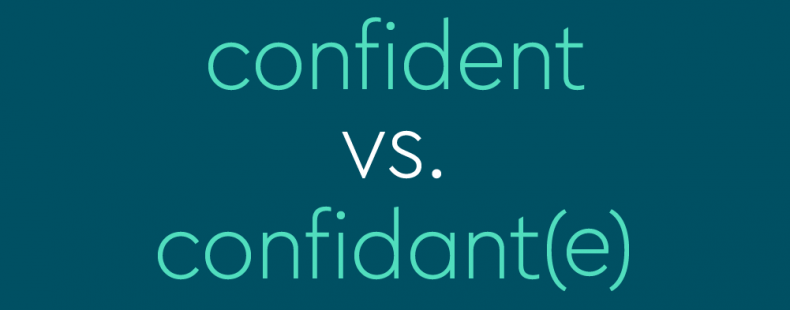Before getting on stage to audition for the school play, Monica needed to believe in herself and reflect on her talent. But as she peeked out into the auditorium, where the judges were sitting, her self-esteem started to waver.
At that point, was Monica feeling less confident than she was while singing in the shower? Or was she struggling to remain confidant? Or, what about confidante? And since these three words are similar, can they ever be interchanged?
Let’s take a closer look.
What does confident mean?
Confident is primarily used as an adjective meaning “having strong belief or full assurance; sure.” Someone who is confident is bold, completely self-confident, and sure of themselves. They also have “no uncertainty about one’s own abilities, correctness, successfulness.” However they can also be excessively bold or presumptuous.
For example: He’s incredibly talented, and while he’s confident, he never projects arrogance.
Synonyms for confident include certain, positive, sure, self-reliant, and assured.
What does confidant mean?
Next up is confidant: a noun that’s defined as “a close friend or associate to whom secrets are confided or with whom private matters and problems are discussed.”
For example:
- Some describe the colleague as her “work husband” because they are close confidants in the office.
- Samuel describes his ideal marriage as one in which his partner is both his best friend and confidant.
Synonyms for confidant include adviser, companion, and crony.
What does confidante mean?
Lastly, there’s confidante. The addition of the e may seem like a slight change, but it does alter this noun’s meaning. Confidante is defined as specifically a woman “to whom secrets are confided or with whom private matters and problems are discussed.”
For example: Emery was not only her neighbor, but also her life-long confidante, someone who was always there for her when she had problems that she couldn’t share with her own mom.
Synonyms for confidante include companion, confidant, and crony.
Where do these words come from?
There’s a good reason why these words seem similar: they come from the same root. All three are derived from the Latin confīdere, which is equivalent to con- (with) and fīdere (“to trust”).
Confident is the first of the three to be recorded in English around 1570–80. Historically, confident was used as a noun, like confidant, but confidant and confidante, took its place and prevailed. They were first recorded around 1705–15 and developed from the French word confident (“person trusted with private affairs”).
Believe it or not, English shared the practice of gendering nouns until around the 1200s. Words like confidant and confidante were borrowed from French, which like Spanish, has grammatical gender. (This is how we get the whole blond vs. blonde conundrum.) In French, confident is the masculine form; adding the e makes it feminine.
How to use each
If you need a tip to help keep these three words straight, you might try mentally separating them as E versus A. So confident versus confidant(e).
From there, remember that you need self-confidence to be confident. You can also think e for “energy” or the positive energy someone needs to be confident. Once you remember that confident always deals with confidence, it’s easier to keep that one straight.
Then we have confidant versus confidante. These two both refer to a trusted person or advisor but can’t always be interchanged. That’s because a confidant can be a man or a woman, but when an e is added to the ending, it means a reliable companion who is strictly a woman.
For example, they can be interchanged in a case like this:
- My mother isn’t just a parent, she’s also my most trusted confidant.
- My mother isn’t just a parent, she’s also my most trusted confidante.
But can’t be interchanged here:
- My father isn’t just a parent, he’s also my most trusted confidant.
If we look back on the original example about the school play, we now know that confidence is what an actor needs at an audition. Monica needed to remain confident in order to perform on stage. (That said, we hope she has a close confidant who provides moral support as well!)
An ideal confidant is one who won’t pass any judgment on you for not knowing the difference between judgment and … judgement. There’s that sneaky letter e again! Find out the difference between judgment and judgement here.














